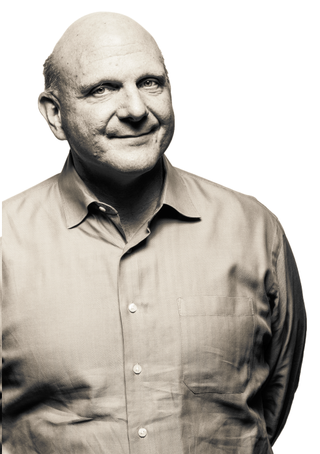What to make of Ballmer's time at the top at Microsoft
Visionary, tyrant or liability? Jane McCallion casts an eye over Steve Ballmer's tenure as Microsoft CEO.

"There is never a perfect time, but now is the right time," explained Microsoft CEO Steve Ballmer in his memo to staff telling them he would be retiring within the next 12 months.
To say that Ballmer's 13-year reign has been controversial, not to mention eccentric, would be an understatement.
Ballmer is a man who divides opinions and his detractors are more numerous than his supporters.
He is perhaps as well known for his stage presence, whether it be chanting developers' over and over again or crashing Qualcomm's CES keynote, as he is for being the head of the world's largest software firm.
But he also had big shoes to fill. Bill Gates, who co-founded and led the company for 25 years, was and remains one of the most recognisable and highly thought of people in the tech industry. It's difficult to follow an act like that.
So, as the Ballmer years draw to a close, what are we to make of them?
The fans
Out and out Ballmer fans are hard to come by, particularly ones who will speak on the record. According to a recently published Slashdot article, employees past and present have been warned off talking publicly about Ballmer, even in a positive light, following a particularly scathing article in Vanity Fair.
Get the ITPro. daily newsletter
Receive our latest news, industry updates, featured resources and more. Sign up today to receive our FREE report on AI cyber crime & security - newly updated for 2024.
Nevertheless, someone who has spoken out is former employee Matt Rosoff.
"What a lot of outsiders don't understand is that Ballmer is a numbers guy," wrote Rosoff in a 2011 Business Insider article, published on the 11th anniversary of the CEO's appointment.
"He majored in mathematics -- not business, not computer science. Ballmer may appear irrational from the outside, but his decisions are driven by the numbers. Sales. Revenue. Expenses. Income. Trends. That's it," Rosoff added.
Stories about Ballmer's temper are "way overblown", he added, but if you disagree with him on something fundamental, he is the one in charge.
"That sounds like just about every other boss in the world" he concluded.
The foes
Ballmer is a man who divides opinions and his detractors are more numerous than his supporters.
As long ago as 2011 two years after Bill Gates gave up his decision making powers to become a non-executive chairman there were calls for his resignation.
In May of that year David Einhorn, an influential hedge fund manager who forewarned that Lehman Brothers was headed for a fall three years before the bank collapsed, called on Ballmer to resign.
Prompted by IBM and Apple overtaking the Redmond giant in terms of market value, Einhorn said Ballmer's "continued presence [as CEO] is the biggest overhang on Microsoft's stock". He also stated that Ballmer was, in his opinion, stuck in the past.
Entrepreneur and author Adam Hartung took an even harsher tone, describing Ballmer as "the worst CEO of a large publicly traded American company today".
"Not only has he singlehandedly steered Microsoft out of some of the fastest growing and most lucrative tech markets...but in the process he has sacrificed the growth and profits of not only his company but ecosystem' companies such as Dell, Hewlett Packard and even Nokia," he said in a 2012 Forbes article.
More recently, former employee Joachim Kempin claimed Ballmer only kept his position as top dog by forcing out rising stars.
"Steve is a very good business guy, but make him a chief operating officer, not a CEO, and your business is going to go gangbusters," said Kempin. "I respect that guy (Ballmer), but there are some limitations in what he can and can't do and maybe he hasn't realised them himself."
The facts
What could never be argued is that Microsoft under Ballmer's reign was not successful. Under his tenure, the company's annual revenue almost tripled, rising from $25 billion (18.76 billion) to $70 billion (52.54 billion). Its net income rose 215 per cent to $23 billion (17.26 billion) and annual profit grew by 16.4 per cent.
However, Microsoft's share price has been fairly stagnant over the last 10 years, particularly when inflation is taken into account.
He was also at the helm when Microsoft dropped some serious clangers, such as Windows Vista (although Bill Gates was still the chief software architect at that time). Things don't look great for the Surface Pro either.
The farewell
So what to make of Ballmer. Well, in some ways, it's hard to say the personality discrepancies between the manic gate-crashing stage presence, the alleged talent extinguishing tyrant and the visionary numbers guy are vast. Who is the real Ballmer?
While I think it's fair to say he doesn't quite have the legendary quality of Steve Jobs or Bill Gates, it is too easy to write him off as a highly eccentric mistake on the part of Gates (who promoted him to CEO).
Sure, he's known for his clownish antics, but he has overseen a steady growth period during the time he has been CEO and was fully in charge during the development and release of the highly successful Windows 7.
Perhaps, much like Ballmer himself, the person who succeeds him will have quite big shoes to fill.

Jane McCallion is ITPro's deputy editor, specializing in cloud computing, cyber security, data centers and enterprise IT infrastructure. Before becoming Deputy Editor, she held the role of Features Editor, managing a pool of freelance and internal writers, while continuing to specialise in enterprise IT infrastructure, and business strategy.
Prior to joining ITPro, Jane was a freelance business journalist writing as both Jane McCallion and Jane Bordenave for titles such as European CEO, World Finance, and Business Excellence Magazine.




